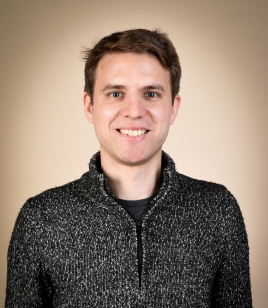Stipendiat:innen /
Porträts
Julian Wienand (English version)

Topic of doctoral thesis: "Quantum gas microscopy of fluctuating hydrodynamics in optical ladders"
LMU MunichThe Marianne-Plehn-Program (MPP) enabled Julian Wienand to combine his experimental doctoral thesis with work in a theoretical research group at LMU Munich. He feels very much at home in the city, and not just because of the professional connections. In the final phase of his doctorate, he has not yet decided what to do next.
The topic of Julian Wienand's dissertation, which he began in July 2020, sounds rather complex at first: quantum simulation experiments using ultracold atoms in optical lattices. He explains his research as follows: "We manipulate individual atoms trapped in a lattice of light with lasers and use them to study the fundamental physics of quantum many-body systems". From the behavior of the atoms, conclusions can be drawn about phenomena in solid-state physics. "You can compare it to an airplane model that is tested in a wind tunnel. It's easier and safer than building the plane and testing it in the open air".
Theory and practice
During his studies in Würzburg and Munich, the 27-year-old became increasingly enthusiastic about experimental physics. "I find it exciting to be able to see with my own eyes and help shape how an idea becomes an experimental reality," says Julian Wienand. Developing the technology and working on the perfect experimental set-up make his day-to-day work in the lab varied and diverse. However, it was clear to Julian Wienand that his doctoral project would not only require tinkering in the laboratory, but also a comprehensive theoretical understanding of the underlying physical systems. As part of the Marianne-Plehn-Program, he was able to combine his experimental work with a position in another theoretical research group.
"This gave my doctorate an additional dimension. In addition to access to a great deal of theoretical knowledge, this also includes the opportunity to present my work to a new audience and gain new impetus in discussions with theoretical physicists," he reports.
Broad interests
Munich was not only the right location for Julian Wienand because of the academic connections, but also due to the wide range of leisure activities and the rich cultural offerings. As he did during his studies, he continued to organize hiking tours for other students. "Being out in nature together is inspiring, invites exciting conversations and creates friendships," says the former scholarship holder. Additionally, he also plays the double bass, most recently in the Munich student orchestra, and composes and arranges his own pieces. He also implements smaller IT projects. He is fascinated by being able to solve tasks more efficiently and better with just a few resources: "With a little know-how, almost anyone can create beautiful and useful things out of nothing - without material resources, just with code and time".
And after the doctorate?
The final phase of his doctorate also raised the question of the future for Julian Wienand. He increasingly doubted his original plan to stay in academia in the long term: "It feels good to have contributed to my field through my work and to have sparked new research projects through interesting results," he says, "but instead of staying in a niche area, I would prefer to be able to deal with a broader range of topics." He advises other doctoral candidates to consider alternatives outside of academia at an early stage and to make targeted use of the events and network the program offers for this purpose.
It is not yet clear where and how Julian Wienand will continue: the mountains and the nearest opera house should not be too far away, however.
More information
Last updated: May 2024

